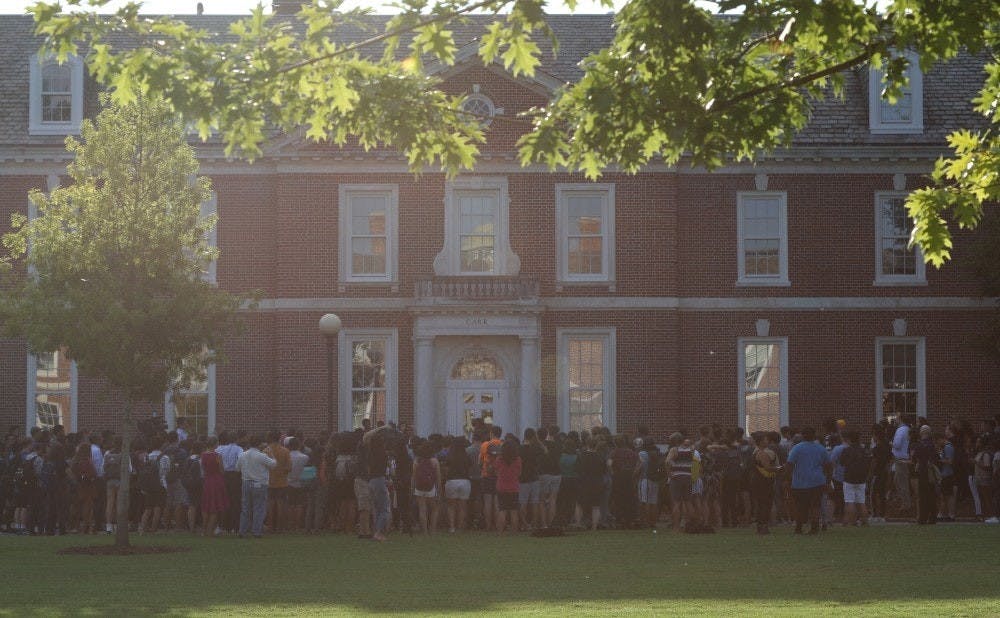It’s not a secret that Duke can suck. In my three years as a student, there have been multiple incidents of bias and hate targeted at a number of marginalized groups, from graffiti to death threats and back again. There have been administrative actions—or inactions—that make significant parts of the Duke community feel unwelcome and unsafe. And the social culture at Duke is riddled with self-segregation, gender violence, and a suffocating pressure to be perfect.
And yet, Duke is incredible. It has given me free reign to explore my intellectual passions in the company of brilliant academics. It has given me the financial support to travel the world and supported my development through research opportunities and summer programs. And it continues to provide me with a community of diverse, curious and passionate young people who challenge and inspire me every day.
So how can such a wonderful place be so terrible? And if Duke is so objectionable, why are we beyond lucky to be here?
As my last year at Duke gets under way, I have realized that to love Duke fully is to recognize its potential while engaging in its criticisms. When I critique Duke, it is not because I hate it here; quite the opposite. It’s because I love this school and the opportunities it has given me, and I want it to do better, for myself, for my peers and for the generations of Duke students who will come after me.
Last month, I attended the rally outside the Carr Building protesting white supremacy at Duke. As I listened to students, professors and community members speak with passion about the history of racism and power structures at Duke, I felt a strange mix of outrage and gratitude. I was angry to learn how white supremacy was so deeply intertwined with Duke’s history and how little the institution has done to right those wrongs. But I felt grateful to have peers who are engaged in Duke’s history and are unafraid to hold the school, its administrators and its students accountable. If there’s one aspect of injustice at Duke that I have found consistent, it’s that the students are the first ones to call it out and the ones who relentlessly push for change. In this weird, twisted way, realizing one of Duke’s biggest flaws has helped me appreciate one of its biggest assets.
This paradox threads through all aspects of my Duke experience. I can sit here and debate the ethical gray area of DukeEngage, and this debate is an important one, but my DukeEngage experience was incredibly transformative and my Duke experience has been more meaningful because of it. I find the rush and recruitment processes at Duke to be demoralizing and emotionally destructive, but I would never want to deny a sense of community to the many Duke students who have found their home in a Greek or selective living organization. I hate that Duke makes many of its largest decisions with money in mind, but the generosity of donors is the only reason I can afford to even be here.
It is not lost on me that there are a lot of things wrong with Duke. But neither is it lost on me what a rare and special opportunity it is to be here. The fact that I am at Duke means that others are not, and it’s not just the thousands of applicants who are not accepted every year—it’s the thousands, maybe millions, of young people who have the drive and the intellect to be here, but due to factors outside of their control, they were never in a situation where they could even apply.
The longer I have been at Duke, the easier it has been to be jaded. But I have to remind myself that my frustrations with Duke are rooted in my investment in the school. What a shame it would be to waste my senior year wringing my hands over everything wrong with Duke without appreciating everything that is right: the life experiences this school has provided me, the lunches-turned-philosophical debates in our beautiful “dining hall,” the depth of relationships with people I would never have known if not for Duke. I will always be critical of Duke and immensely grateful for it at the same time, and I wouldn’t want it any other way.
Ethan Ahuna is a Trinity senior. His column runs on alternate Tuesdays.
Get The Chronicle straight to your inbox
Signup for our weekly newsletter. Cancel at any time.

